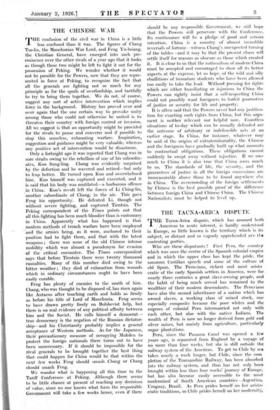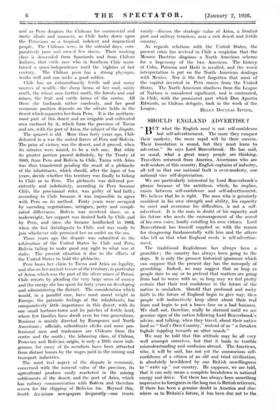THE TACNA-ARICA DISPUTE
THE Tacna-Arica_ dispute, which has aroused both Americas to acute interest, is hardly understood in Europe, so little known is the territory which is its subject, so distant and so vaguely apprehended are the contesting parties.
Who are these disputants ? First Peru, the country which was once the centre of the Spanish colonial empire and in which the upper class has kept the pride, the sonorous Castilian speech and some of the culture of old Spain. The Peruvians, richest and most aristo cratic of the early Spanish settlers in America, were for. nearly three centuries a great slave-owning people, and the habit of being much served has remained to the wealthier of their modern descendants. The Peruvians have also the second inheritance of a nation which has owned slaves, a working class of mixed stock, one especially composite because the poor whites and the negroes of colonial Peru intermarried not only with each other, but also with the native Indians. The wealth of Peru is now no longer derived from gold and silver mines, but mainly from agriculture, particularly sugar plantations.
Peru, since the Panama Canal was opened a few years.. ago, is separated from England by a voyage of no more than four weeks; but she is still outside the railway system of the Americas. To get to Chile by sea takes nearly a week longer, but Chile, since the corn pletion of the Transandine Railway, has been absorbed into the railway system, and thus has not only been brought within less. than 'four weeks' journey of Europe, but has also become easily accessible to the most modernized Of South American countries—Argentina, Uruguay, Braiil. As Peru prides herself on her aristo- cratic traditions, So Chile prides, herself on her modernity, . and as Peru despises the Chileans for commercial and rustic ideals and manners, so Chile looks down upon the Peruvians as a tropical, indolent and impractical people. The Chileans were, in the colonial days, com- paratively poor and owned few slaves. Their working class is descended from Spaniards and from Chilean Indians, that virile race who in Southern Chile main- tained a quasi-independence until the 'eighties of last century. The Chilean peon has a strong physique, works well and can make a good soldier.
Chile has an extraordinarily fertile soil and many sources of wealth—the sheep farms of her cool, misty south, the wheat area further north, the forests and coal mines, the fruit and cattle farms of the centre. All these she husbands rather carelessly, and her good economic position depends on the nitrate fields in the desert which separates her from Peru. It is the northern- most part of this desert and an irrigable and cultivated area enclosed by it, which form the province of Tacna and are, with the port of Arica, the subject of the dispute.
The quarrel is old. More than forty years ago, Chile defeated in a war the united forces of Peru and Bolivia. The prize of victory was the desert, and it proved, when its nitrates were mined, to be a rich one. But while its greater portion passed definitely, by the Treaty of 1883, from Peru and Bolivia to Chile, Tacna with Arica was thus transferred pending the result of a plebiscite of the inhabitants, which should, after the lapse of ten years, decide whether this territory was finally, to belong to Chile or to Peru. The plebiscite was deferred per- sistently and indefinitely, according to Peru because Chile, the provisional ruler, was guilty of bad faith ; according to Chile because it was impossible to agree with Peru on its method. Forty years were occupied by unending negotiations, intrigues, petty and compli- cated differences. Bolivia was involved since, as a makeweight, her support was desired both by Chile and . by Peru, and since she became landlocked in 1883, when she lost. Antofagasta to Chile, and waS ready to join whichever side promised her an outlet on the sea.
Three years ago the dispute was submitted to the arbitration of the United States by Chile and Peru, Bolivia failing to make good any right to what was at stake. The present situation is due to the efforts of the United States to hold the plebiscite.
Peru bases her claim to Tacna and Arica on legality, and also on her ancient tenure of the territory, in particular of Arica, which was the port of the silver mines of Potosi. Chile retorts by pleading the very large sums of money and the energy she has spent for forty years on developing and administering the district. The consideration which would, in a parallel ease, have most moral weight in Europe, the patriotic feelings of the inhabitants, has comparatively little importance in this desert, with its one small harbour-town and its patches of fertile land, where few families have dwelt even for two generations. Business is mainly directed by Europeans and _North Americans ; officials, subordinate clerks and some pro- fessional men and tradesmen are Chileans from the centre and the south ; the labouring class, of Chilean, Peruvian and Bolivian origin, is only a little more indi- genous, for many of its members have been attracted from distant homes by the wages paid in the mining and transport industries.
The most real aspect of the dispute is economic, concerned with the mineral value of the province, its agricultural produce easily marketed in the _,mining settlements of the desert, and the port of Arica, which has railway communication with. Bolivia and therefore serves for the ;lipping of Bolivian tin. Beyond this, South Atrft-ican newspapers frequently—one trusts vainly—discuss the strategic value of Arica, a frontier port and railway terminus, near a rich desert and fertile country.
As regards relations with the United States, the present crisis has revived in Chile a suspicion that the Monroe Doctrine disguises a North American scheme for a hegemony of the two Americas. The history. of Cuba, Panama and Haiti is recalled, and the worst interpretation is put on the North American dealings. with Mexico. Nor is the fact forgotten that most of the capital invested in Peru comes from the United' States. The North American aloofness from the League of Nations is considered significant, and is contrasted, in Chile, with the prominent part which Don Agustin Edwards, as Chilean delegate, took in the work of the











































 Previous page
Previous page